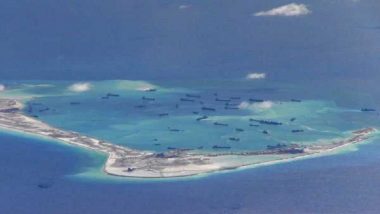United Nations, August 9: In a veiled attack on China, the US on Monday told a high-level UNSC meeting on maritime security hosted by India that the conflict in the disputed South China Sea will have "serious global consequences" for security and commerce.
Addressing the virtual open debate on ‘Enhancing Maritime Security: A Case for International Cooperation', US Secretary of State Antony Blinken underlined that when a State faces no consequences for ignoring the rules, it fuels greater impunity and instability everywhere.
Prime Minister Narendra Modi chaired the debate on maritime security under India's Presidency of the UN Security Council. The debate was also attended by Russian President Vladimir Putin. China Reports Deadly Anthrax Pneumonia Case From Northern Hebei Province’s Chengde City.
“Let me just speak if I could specifically to some of the critical areas where we see maritime rules and principles under threat. In the South China Sea, we have seen dangerous encounters between vessels at sea and provocative actions to advance unlawful maritime claims,” Blinken told the debate that was later chaired by External Affairs Minister S Jaishankar.
“The United States has made clear its concerns regarding actions that intimidate and bully other states from lawfully accessing their maritime resources. And we and other countries including South China Sea claimants have protested such behaviour and unlawful maritime claims in the South China Sea,” he said.
Blinken referred to the unanimous and legally binding decision taken five years ago by the arbitral tribunal constituted under the 1982 Law of the Sea Convention "firmly rejecting unlawful, expansive South China Sea maritime claims as being inconsistent with international law.”
He stressed that Washington has consistently called for all countries to conform their maritime claims to the International Law of the Sea as reflected in the 1982 convention. “This is in keeping with the peaceful resolution of disputes and the sovereign equality of member states, which are core principles enshrined in the United Nations Charter,” he said, adding that efforts to resolve maritime disputes through threat or use of force flout these principles.
“Some may assert that resolving the dispute in the South China Sea is not the business of the United States or any other country that is not a claimant to the islands and waters. But it is the business, and even more, the responsibility of every member state to defend the rules that we've all agreed to follow and peacefully resolve maritime disputes,” Blinken said.
“Conflict in the South China Sea or in any ocean would have serious global consequences for security and for commerce. What's more, when a State faces no consequences for ignoring these rules, it fuels greater impunity and instability everywhere,” Blinken said, in a veiled reference to China.
China claims sovereignty over all of the South China Sea. Vietnam, Malaysia, the Philippines, Brunei and Taiwan have counterclaims. China is engaged in hotly contested territorial disputes in both the South China Sea and East China Sea. Beijing has built up and militarised many of the islands and reefs it controls in the region. Both areas are stated to be rich in minerals, oil and other natural resources and are also vital to global trade.
Blinken conveyed the US' gratitude to Prime Minister Modi for “bringing us together for this critically important discussion” on maritime security and for India's leadership on these issues especially in the Indo-Pacific.
He said despite having a clear body of international law that nations have committed to abide by and uphold and despite the indispensable role the maritime order has played in fostering economic activity, security cooperation, scientific innovation, environmental sustainability, “the order is under serious threat”.
"That's why I'm grateful for India's leadership in bringing us together today and calling on all nations to recommit to defending and strengthening the maritime rules and principles that we forge together and committed to uphold,” Blinken said.
He said states are also “provocatively” advancing their interests in the Persian Gulf and the Black Sea. He said that on July 29, The Mercer Street, a commercial ship that was peacefully transiting international waters in the North Arabian Sea was attacked using explosive unmanned aerial vehicles, resulting in the death of two people. Taliban Captures Afghanistan's Samangan Province Capital Aybak City as Violence Intensifies.
“Upon review of the available information, we are confident that Iran conducted this unjustified attack, which is part of the pattern of attacks and other provocative behaviour,” he said, adding that these actions threaten freedom of navigation through this crucial waterway, international shipping and commerce and the lives of people on the vessels involved.
Blinken said it was on “all of our nations” to hold accountable those responsible and failing to do so will only fuel their sense of impunity and embolden others inclined to disregard the maritime order. He noted with concern that non-state actors also pose serious risks to maritime safety and security.
“From pirates and illicit maritime traffickers in the Gulf of Aden and the Indian Ocean to pirates and armed robbers in the Gulf of Guinea to drug traffickers in the Caribbean Sea and the eastern Pacific. Yet our collective response for these actors shows how effective we can be when we work together to defend maritime order and hold those accountable who violated,” Blinken said.
“We see it in India's Maritime Fusion Centre, which has enhanced cooperation among Indian Ocean partners and the widespread ratification by countries in the Caribbean Basin of the Treaty of San Jose,” he said. Blinken expressed gratitude to fellow Security Council members for supporting annual resolutions to help coordinate and strengthen these efforts.
“We must bring the same coordinated and comprehensive responses to other threats to maritime safety and security,” he said. Blinken said it included illegal, unreported and unregulated fishing, which undermines the sustainability of fish stocks, circumvents agreed conservation and management measures and violates the sovereign rights of coastal states, and often goes hand in hand with the use of forced labor and other illicit activities.
“Together, our nations have spent decades building this maritime order and the broader rules-based international system that it is a part of,” he said. “We've done so out of a shared recognition that it benefits all our nations and all our people ‘when governments accept certain constraints on their actions, rather than living in a world where the strong do what they can and where those who are less powerful feel coerced and threatened.'
"That has never been more true than it is today. And that makes the collective effort to defend, to strengthen and build upon this order more urgent than ever," the top American diplomat said.
(This is an unedited and auto-generated story from Syndicated News feed, LatestLY Staff may not have modified or edited the content body)













 Quickly
Quickly















 SRH
SRH







